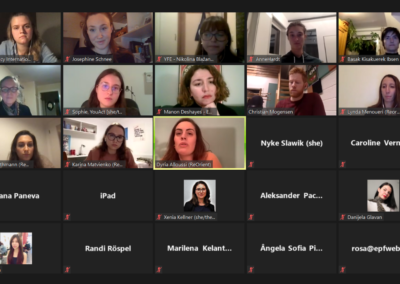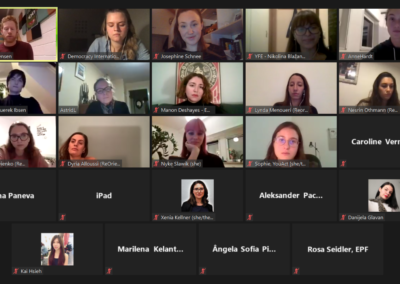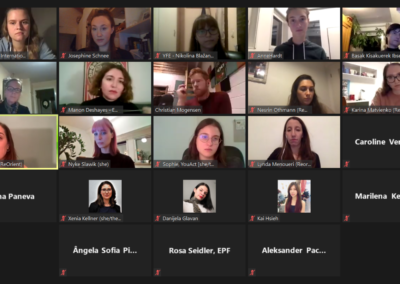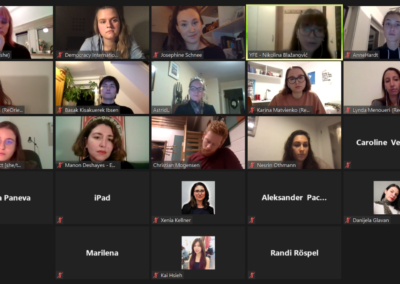Europe Jam on Gender in Europe
Europe | In the last Europe Jam of 2020, we welcomed guests who work in and beyond the EU on the topic of gender equality. We started together into the round of introductions, where the following questions were answered: What are the biggest problems in the field of gender equality in the EU? And what are your suggested approaches to solve these problems?
On the question of the biggest problems in gender equality in the EU, the participants agreed that the existing injustice has a historical and culturally determined background. Historically, it has always been the case that almost exclusively white cis men have been the power holders in the European states. Even today, the idea of a submissive image of women is firmly anchored in many European cultures.
In addition to the historic-cultural developed binary gender positioning, the following problems contribute to the existing inequality: The right to self-determination over one’s own body and violence against women were seen as primary problems by many participants. The EU would do too little preventive work in this area, so that women’s and human rights organisations would often take over the work of the states.
Our Europe Jam on Gender in Europe on 15 Dec. 2020
Furthermore, the participants discussed the lack of comprehensive sexuality education in schools but also in adult education. Gender-segregated sex education without any reference to gender theory is the cause of the binary gender notion that still prevails in society and causes the marginalisation of women and members of the LGBTQI+ community.
A practical insight was provided by Astrid Linder from the Swedish National Road and Transport Research Institute, who has been working for more than a decade to enforce the introduction of female car test dummies. For her, it is clear that the female part of the population is not equally represented and as a result receives less attention in society – and way less safety in the driver’s seat.
Representatives of the organisation ReOrient gave the discussion a new direction by reporting on perspectives outside the EU. In the Caucasian region, the Kurdish region and in North Africa, the rights of women, especially Muslim women, were severely threatened or even non-existent.
They pointed out that a female role model, especially a mother, has a great influence on the whole family and therefore also needs to be sensitised for gender equality. Basak Kisakurek Ibsen from the Baltic Gender Project also confirmed that in research the function of a female role model has a positive influence on future scientists.
Jam Riddle
A father and son are in a horrible car crash that kills the dad. The son is rushed to the hospital; just as he’s about to go under the knife, the surgeon says, “I can’t operate – that boy is my son!
Explain 🙂
Furthermore, solidarity among women and the LGBTQI+ community must be strengthened and the perception of a victim role must be discarded. Instead, we need to work together for influence and equality, with a special focus on youth. Youth is too often presented as a problem and not as the key to developing an equal future.
The participants ended the debate with a positive view of the future, because the approaches to achieving gender equality have been developed and must now be implemented with strength and progressiveness in all states and on the EU level.
Guests of our Europe Jam on Gender in Europe
- Manon Deshayes – European Women’s Lobby
- Christian Mogensen – Center for Digital Pædagogik
- Astrid Linder – Swedish National Road and Transport Research Institute (VTI)
- Basak Kisakurek Ibsen – Scientific manager of Baltic Gender
- Nyke Slawik – Trans rights & gender activist, Bündnis90/Die Grünen
- Dyria Alloussi – ReOrient
- Nesrin Othman – ReOrient
- Carina Matvienko – ReOrient
- Lynda Menoueri – ReOrient
- Nikolina Blažanović – Young Feminist Europe
- Sophie Beria – YouAct – European Youth Network on Sexual and Reproductive Rights
Many thanks to the Alfred Toepfer Foundation F.V.S. for supporting this project.





